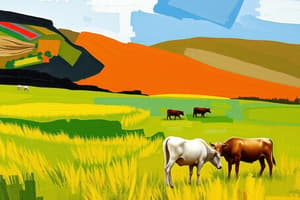Podcast
Questions and Answers
1 LU is equal to 1 cattle between 1-2 years old.
1 LU is equal to 1 cattle between 1-2 years old.
False (B)
In a paddock grazing system, the herd grazes a new paddock every week.
In a paddock grazing system, the herd grazes a new paddock every week.
False (B)
Strip grazing requires less labor than paddock grazing.
Strip grazing requires less labor than paddock grazing.
False (B)
Zero grazing involves cattle grazing the land all year round.
Zero grazing involves cattle grazing the land all year round.
Topping is the process of mowing grass to encourage tillering and control weeds.
Topping is the process of mowing grass to encourage tillering and control weeds.
1 LU is equal to 0.4 sheep.
1 LU is equal to 0.4 sheep.
In block grazing, livestock graze a block for about three weeks before returning.
In block grazing, livestock graze a block for about three weeks before returning.
Leader-follower system allows older animals to graze ahead of young animals
Leader-follower system allows older animals to graze ahead of young animals
Mixed grazing allows cattle and sheep to graze separately in different fields
Mixed grazing allows cattle and sheep to graze separately in different fields
Nitrogen application on grassland where there is clover is unnecessary
Nitrogen application on grassland where there is clover is unnecessary
The most used nitrogen fertilisers are CAN, Urea, and 18-6-12
The most used nitrogen fertilisers are CAN, Urea, and 18-6-12
Artificial fertiliser can be spread in Ireland from mid-September to mid-January
Artificial fertiliser can be spread in Ireland from mid-September to mid-January
Quantity and time of application of fertiliser are determined by the type of livestock: grazing or silage
Quantity and time of application of fertiliser are determined by the type of livestock: grazing or silage
Tillering is increased when sheep graze close to the ground
Tillering is increased when sheep graze close to the ground
Flashcards are hidden until you start studying
Study Notes
Livestock Unit (LU)
- 1 Livestock Unit (LU) = 1 dairy cow or 1 suckler cow
- Used to determine the amount of grass or winter fodder needed on a farm
Animal Livestock Unit
- 1 Dairy/Suckler Cow = 1 LU
- 1 Cattle (1-2 years) = 0.6 LU
- 1 Cattle (< 1 year) = 0.4 LU
- 1 Sheep = 0.15 LU
Methods of Grazing
- Rotational Grazing: moving animals around several grazing fields
Paddock Grazing
- Land divided into paddocks of equal size
- Herd grazes a new paddock every day
- Grazed paddocks fertilized and allowed to recover for at least three weeks
- Advantages: fresh, leafy grass each day, no grass wasted
- Disadvantages: expensive to set up, fencing and water supply needed in each paddock
Strip Grazing
- Moveable electric fence divides a field
- Fresh strip of grass given to livestock each day
- Requires more labor than paddock grazing, ensures no grass wasted
Block Grazing
- Dividing large fields into smaller blocks
- Livestock graze a block for about one week, return to a block after three weeks
Zero Grazing
- Cattle housed all year round
- Grass or other forage crops cut and brought indoors and fed to livestock
- No grazing on the land
Topping
- Mowing grass to encourage tillering and control weeds
Leader-Follower System
- Young animals (calves) graze ahead of older stock
- Young animals get freshest, leafiest, most digestible grass
- Less chance of young animals picking up disease and parasites from grass or older animals
Mixed Grazing
- Cattle and sheep graze together in the same field
- Tillering is increased, reduces need for topping
Fertilisation of Grassland
- Nitrogen application on grassland without clover to maintain grass quality
- Nitrogen fertilizers: CAN, Urea, and 18-6-12
- Nitrogen application according to Nitrates Directive
- Quantity and time of application determined by land use (grazing or silage)
Studying That Suits You
Use AI to generate personalized quizzes and flashcards to suit your learning preferences.




